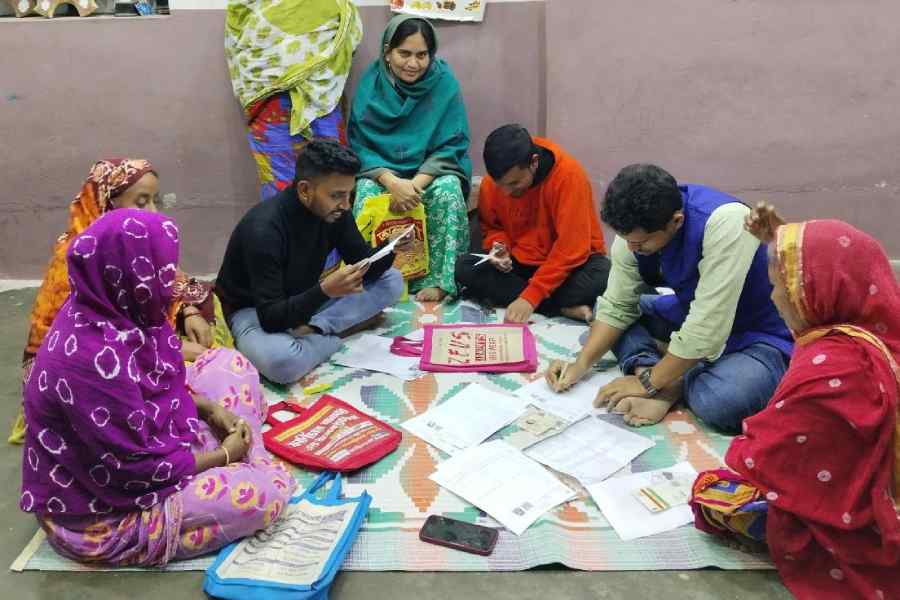Calcutta: Forty-two-year-old Ramen Biswas (name changed on request) of Majhdia of Nadia gave a vacant, almost defeated look, when asked if he had submitted the enumeration form for the special intensive revision (SIR).
A Hindu migrant from Kushtia in Bangladesh who settled in Nadia nearly two decades ago, he nodded and muttered that it would have been better not to submit the form, but he had no choice.
A Matua by faith who entered India and eventually managed to get his name enrolled in the Krishnaganj Assembly poll roll in 2004, Biswas filed his SIR form with parental details section left blank. The reason: his parents’ names did not appear in the 2002 electoral roll. The form is now marked for scrutiny.
In Gaighata of North 24-Parganas, Rasik Halder faces a similar predicament. Despite submitting his SIR form, the booth-level officer (BLO) could not trace Halder’s parental linkage. Halder, originally from Jessore in Bangladesh, entered India in 1995 and became a voter in 2005. He later brought his parents over but failed to provide documents to prove their presence in the 2002 roll. To support his claim he submitted a paper asserting his father’s name figured in the 2002 list, which turned out to be incorrect. His form, too, is headed for scrutiny.
Ramen and Rasik are not isolated cases. Across south Bengal, especially in Matua-dominated belts, the ongoing SIR exercise has triggered a wave of anxiety.
Many voters — most backing the BJP in recent polls — now fear deletions because they cannot prove their parental link to 2002, a year
when many had not even entered India.
With only a few days left before the door-to-door enumeration closes, the mood among these groups is unmistakably grim. Only those who arrived in the early 1970s — often fleeing religious persecution and political violence — seem
less worried.
Most Matua families trace their origins to Khulna, Jessore, Kushtia and Chuadanga in Bangladesh. They started migrating after 1971, often “illegally”, and painstakingly built new lives in Nadia, North 24-Parganas, East Burdwan, and pockets of north Bengal. Over time, they became voters. But the Citizenship Act of 2003 rendered them refugees until proven otherwise, a status that continues to haunt them.
Even after 1971, cross-border movement continued for both Hindus and Muslims, swelling populations in border-proximate districts. The Matua community — mostly belonging to the Namosudra caste — grew into a formidable “vote bank”. Now, the SIR’s stringent verification norms have pushed this community into a new uncertainty.
On Tuesday in Krishnaganj, a BLO struggled to convince an applicant whose document listed his father with a different surname. The applicant said: “I came to India in 1998 and became a voter in 2004. I have no documents now. My father’s name in the rolls was wrong, which I now want to rectify. So I requested the BLO to accept my documents and ensure a hearing.”
The BLO’s response was a curt negative.
With the number of Matua voters lacking 2002-linked documents rising sharply, the volume of hearing appeals has increased across Matua-dominated pockets. A BLO in Nadia admitted that many migrants were not concerned about their parents’ names earlier.
“The names they provide now may not be genuine. Many applicants are leaving the parental details column blank,” he said. “It compounds the problems.”
In Gaighata, nearly 52 per cent of voters are in the “red zone” — those whose names or parental names do not appear in the 2002 list. BLOs are allegedly being pressured by local political leaders to match parental names with anyone sharing the same name.
An voter said: “Under instructions from Trinamool leaders, I requested the BLO to match my father’s name with any person with the same name so that my name stays as a voter.”
Gaighata, with 1,56,392 voters, has 82,328 absentees from the 2002 rolls. According to Matua sources, these are late-80s immigrants. Being marked “red zone” means they are on the brink of deletion unless they can establish linkage to 2002.
Many are mulling citizenship applications under the CAA. Pro-BJP Matua leaders, BJP MP Shantanu Thakur and local party units have been urging community members to apply for citizenship to “secure voter status”, even claiming they are in talks with the Union home ministry to treat online CAA acknowledgement as proof of identity and exemption of 2002 linkage. But after chief minister Mamata Banerjee’s public meeting in Bongaon on Tuesday, attendance at BJP-backed camps reportedly thinned.
Mamata had asked people to use their brains and said: “The religious certificate and CAA form certifies that the holder was a Bangladeshi.” She alleged the BJP was misleading the Matuas by claiming the certificate would secure enrolment as a voter.
A Matua resident of Bongaon spelt out his dilemma: “I decided to apply for citizenship like many in our community have done. But after Mamata Banerjee’s advice, I have to think carefully.”
Applying for citizenship posed complications, he admitted. “It will take at least three years,” he said.
The BJP may face an unexpected setback if lakhs of migrant Hindu voters and Matuas are removed from the rolls before the 2026 Assembly polls.
A Bongaon BJP leader said: “The aim of removing Bangladeshi Muslim voters is now secondary, protecting immigrant Hindu voters and Matuas is more important. We are trapped in our own net.”
Trinamool-aligned Matua leaders acknowledged the gravity of the situation despite their political optimism. However, Prasenjit Biswas, an advocate and community leader close to the party, said: “A last-minute central ordinance accepting the CAA as a valid exemption document could change the game in the BJP’s favour.”











